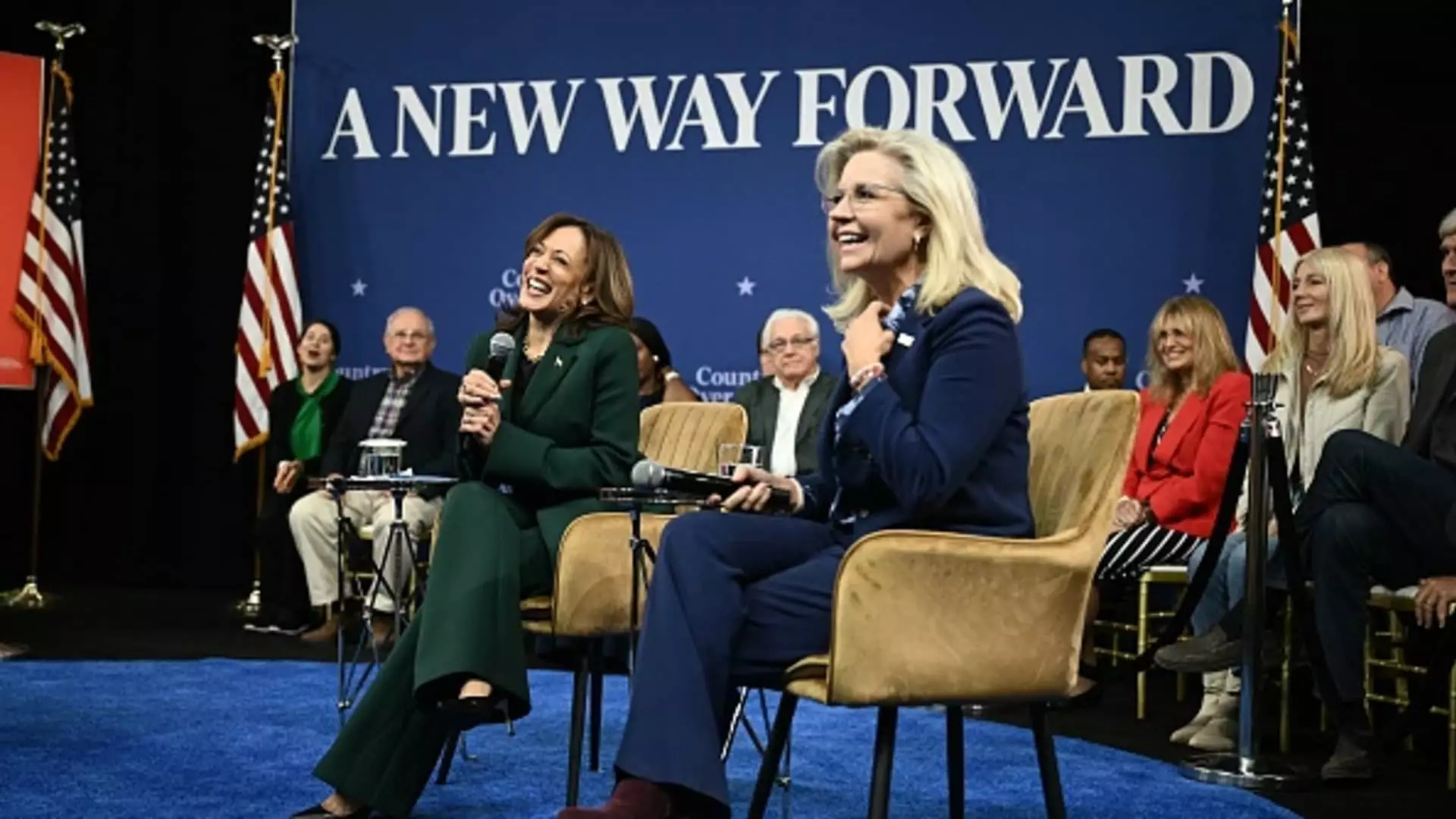In a phenomenon that challenges traditional party lines, Vice President Kamala Harris and former Republican Representative Liz Cheney are embarking on a politically charged dialogue through the battleground landscapes of Pennsylvania, Michigan, and Wisconsin. Their collaboration sends a clear message: core values transcend partisan affiliation. As Cheney articulately pointed out in Birmingham, Michigan, “It’s not about party, it’s about right and wrong.” This sentiment resounds, especially in an era where political affiliations often blind citizens to pressing moral dilemmas.
As the Republicans and Democrats find themselves embroiled in deep-seated polarization, Harris and Cheney’s initiative exemplifies a crucial deviation from the predictable nature of political campaigning. Their partnership is strategically positioned to entice disillusioned Republicans, particularly those who may feel disconnected from the party’s current trajectory under Donald Trump.
Cheney’s endorsement of Harris is particularly significant. In her remarks in Malvern, Pennsylvania, Cheney noted her adherence to conservative principles, emphasizing loyalty to the Constitution as the most essential tenet. She believes that allegiance to constitutional fidelity is paramount in selecting a leader, implying that this value is jeopardized under Trump’s administration. Cheney’s assertions not only position her as a principled politician but also aim to resonate with other conservatives who may have similar inclinations.
Moreover, Cheney’s pro-life stance highlights the internal conflict many conservatives face. Despite her personal beliefs, she openly critiques the increasingly stringent reproductive rights laws established in numerous states post the Supreme Court’s decision to overturn Roe v. Wade. Her acknowledgment that these “draconian restrictions” are unsustainable indicates a willingness to uphold human rights even in the face of party loyalty.
This nuanced approach toward contentious issues reframes the electoral dialogue, inviting voters to consider their ultimate convictions rather than just partisan allegiance.
Harris’s campaign strategy is attentively crafted to win over these disenchanted Republicans. The launch of the “Republicans for Harris” initiative in August symbolizes an outreach to those who may feel sidelined within their party, effectively laying down a welcome mat for voters disillusioned by Trump’s divisive politics. Harris’s commitment to inclusivity extends to her cabinet, which she envisions as a space accommodating diverse perspectives in governance.
This effort is not merely about garnering numbers; it aims to foster a political culture rooted in respectful discourse and genuine debate. As Harris passionately stated, “We need a healthy two-party system.” Her comments reflect a vision whereby bipartisan discussions could lead to the cultivation of solutions grounded in factual analysis rather than seemingly dogmatic ideology.
Liz Cheney is carving out a significant role in this political landscape as a bridge between the two parties. Her presence is increasingly seen as creating a “permission structure” for Republicans hesitant to abandon Trump’s orbit. By openly associating with Harris, Cheney is encouraging Republicans who prioritize the country’s well-being over party lines to consider their options on Election Day.
Cheney’s patriotism runs deep, as she articulates a “duty and obligation” for Republicans to act in the nation’s interest. Her perspective is a critical reminder of the importance of citizenship transcending party loyalty. The notion that political representatives must prioritize the nation’s welfare above party politics cannot be overstated in today’s tumultuous climate.
In their conversations, both Harris and Cheney have not shied away from critiquing Trump’s foreign policy, underscoring a shared apprehension about the implications of potential future administrations. Cheney’s assertion that Trump’s isolationist behaviors threaten America’s freedom and security points to a potential vulnerability in his reelection strategy. This critique aligns with a growing sentiment that America’s strength is furthered by collaboration with allies, not contentious withdrawal.
Both leaders also highlight Russia’s aggression towards Ukraine as a critical point in contemporary foreign policy, with Cheney specifically praising Harris’s resolute support for Ukraine during its ongoing conflict. Their united front against Trump’s penchant for undermining alliances sends a clear message to voters concerned about national security and global standing.
In this unprecedented partnership, Kamala Harris and Liz Cheney illustrate how political discourse can might evolve from enmity toward understanding. As they traverse battleground states, they embody a hopeful narrative of cooperation, inviting voters to ponder the significance of their values beyond partisan lines. In a political landscape often marked by division, their collaboration emerges as a beacon of possibility, urging individuals to prioritize morality and constitutional fidelity over party allegiance. This narrative, while still unfolding, holds promising potential to reshape how voters engage with their representatives and consider the broader implications of their political choices.

Leave a Reply